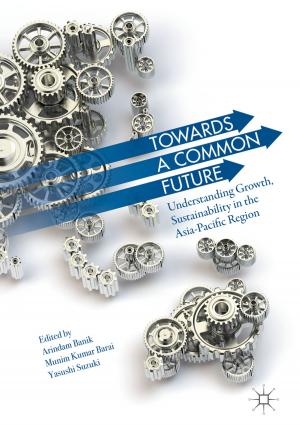Human-Earth System Dynamics
Implications to Civilizations
Nonfiction, Social & Cultural Studies, Social Science, Human Geography, History, World History, Science & Nature, Science| Author: | Rongxing Guo | ISBN: | 9789811305474 |
| Publisher: | Springer Singapore | Publication: | May 16, 2018 |
| Imprint: | Springer | Language: | English |
| Author: | Rongxing Guo |
| ISBN: | 9789811305474 |
| Publisher: | Springer Singapore |
| Publication: | May 16, 2018 |
| Imprint: | Springer |
| Language: | English |
This book explores the factors and mechanisms that may have influenced the dynamic behaviors of earliest civilizations, focusing on both environmental (geographic) factors on which traditional historic analyses are based and human (behavioral) factors on which anthropological analyses are usually based. It also resurrects a number of common ancestral terms to help readers understand the complicated process of human and cultural evolution around the globe. Specifically, in almost all indigenous languages, the words ‘wa’ and any variants of it were originally associated with the sound of crying of – and certainly were selected as the common ancestral word with the meanings of “house, home, homeland, motherland, and so on” by – early humans living in different parts of the world.
This book provides many neglected but still crucial environmental and biological clues about the rise and fall of civilizations – ones that have largely resulted from mankind’s long-lasting “Win-Stay Lose-Shift” games throughout the world. The narratives and findings presented at this book are unexpected but reasonable – and are what every student of anthropology or history needs to know and doesn't get in the usual text.
“Professor Guo explores the dynamics of civilizations from the beginnings to our perplexingly complex world. There are lots of thought-provoking ideas here on the rise and decline of civilizations and nations... Anyone wishing to understand global developments should give this book serious consideration.”
----John Komlos, University of Munich, Germany, and Duke University, USA
“It is interesting to see a Chinese perspective on the questions of deep history that have engaged Jared Diamond, Yuval Harari and David Christian. Guo argues that understanding cyclical threats has been the key to human progress, which is driven by the dialectic of material privation and human ingenuity.”
----Peter Rutland, Wesleyan University, USA
This book explores the factors and mechanisms that may have influenced the dynamic behaviors of earliest civilizations, focusing on both environmental (geographic) factors on which traditional historic analyses are based and human (behavioral) factors on which anthropological analyses are usually based. It also resurrects a number of common ancestral terms to help readers understand the complicated process of human and cultural evolution around the globe. Specifically, in almost all indigenous languages, the words ‘wa’ and any variants of it were originally associated with the sound of crying of – and certainly were selected as the common ancestral word with the meanings of “house, home, homeland, motherland, and so on” by – early humans living in different parts of the world.
This book provides many neglected but still crucial environmental and biological clues about the rise and fall of civilizations – ones that have largely resulted from mankind’s long-lasting “Win-Stay Lose-Shift” games throughout the world. The narratives and findings presented at this book are unexpected but reasonable – and are what every student of anthropology or history needs to know and doesn't get in the usual text.
“Professor Guo explores the dynamics of civilizations from the beginnings to our perplexingly complex world. There are lots of thought-provoking ideas here on the rise and decline of civilizations and nations... Anyone wishing to understand global developments should give this book serious consideration.”
----John Komlos, University of Munich, Germany, and Duke University, USA
“It is interesting to see a Chinese perspective on the questions of deep history that have engaged Jared Diamond, Yuval Harari and David Christian. Guo argues that understanding cyclical threats has been the key to human progress, which is driven by the dialectic of material privation and human ingenuity.”
----Peter Rutland, Wesleyan University, USA















